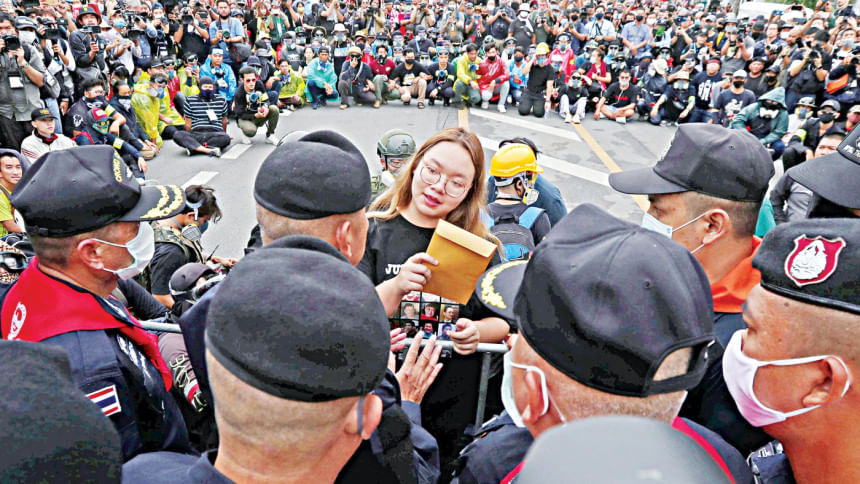Thailand ‘belongs to the people’

Thousands of protesters cheered as activists installed a plaque in Bangkok Sunday declaring that Thailand "belongs to the people" -- the boldest show of defiance in a youth-led movement which is questioning the unassailable monarchy's role in the country.
Thailand has seen near-daily protests for the past two months led by student activists calling for the resignation of Prime Minister Prayut Chan-O-Cha, a former army chief who masterminded the 2014 coup.
Demonstrators spent Saturday rallying in Bangkok's historic Sanam Luang field next to the Grand Palace, where organisers took a stronger line on reform, calling for the royal family to stay out of the kingdom's politics.
Authorities said the demonstration drew 18,000, though AFP reporters on the ground estimated a 30,000-strong crowd at its peak -- making it the largest such gathering Thailand has seen since the 2014 coup.
Yesterday at dawn, student activists installed a commemorative "People's Plaque" in Sanam Luang field.
"Down with feudalism, long live the people," shouted protest organiser Parit Chiwarak to the cheering crowd.
The new plaque states the date Sept 20, 2020, followed by the proclamation: "The people have expressed the intention that this country belongs to the people, and not the king."
The movement is pushing frank questioning of the royal family's role into the public -- once a taboo topic due to Thailand's draconian royal defamation laws.
The plaque references the original brass one embedded for decades in the ground of Bangkok's Royal Plaza, which commemorated the end of royal absolutism in 1932.
But it mysteriously disappeared in 2017 -- after King Maha Vajiralongkorn took power following the death of his father -- replaced with one bearing a reminder for Thais to remain loyal to the "nation, religion, king".

The largely leaderless youth-organised movement, partly inspired by Hong Kong's pro-democracy protests, is calling for Prayut's government to be dissolved, a rewrite of the 2017 military-scripted constitution, and for authorities to stop "harassing" political opponents.
Some factions within the movement have also called for greater accounting of the palace's finances, the abolition of royal defamation laws and a call for the king to remain outside of politics.
King Maha Vajiralongkorn sits at the apex of Thai power, bolstered by a powerful military and conservative establishment.
The new Sanam Luang plaque will be regarded "as an immediate challenge", said analyst Paul Chambers, warning that the growing acrimony could lead to "state violence against protesters".
Prayut has said Thailand would be "engulfed in flames" if the students push too hard, though he vowed "softer measures" against the weekend's protesters.

 For all latest news, follow The Daily Star's Google News channel.
For all latest news, follow The Daily Star's Google News channel. 



Comments